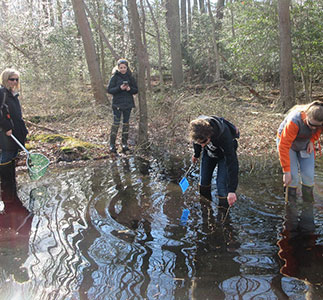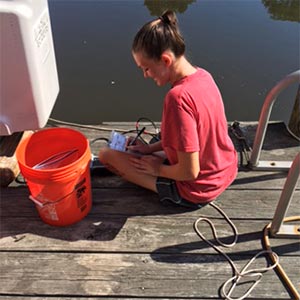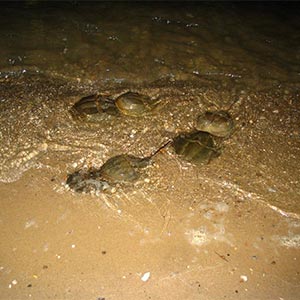Since 1980, the Environmental Center at Anne Arundel Community College has supported the college's mission through applied research projects designed to address local environmental necessities.
AACC's Environmental Center:
Our approach is simple: identify key problems, collaborate with experts, identify and test possible solutions, repeat as needed and then seek new challenges. The center's areas of specialty include:
The Environmental Center established a collaborative effort with the Providence Center, an education/care facility serving developmentally disabled adults, to produce aquatic plants for use in wetlands restoration projects.
The center provides starting material such as seeds to Providence Center clients who in turn plant and grow the numbers of plants needed for a particular restoration project. This collaboration offers the auxiliary benefits of providing jobs and educational opportunities to both AACC students and clients of Providence Center.

Professor Susan Lamont, Ph.D., in cooperation with the Maryland Department of Natural Resources and Sandy Point State Park, is conducting a long-term research study on vernal pool habitat in the Corcoran Woods Environmental Study Area, which is part of Sandy Point State Park. Students from three different biology courses participate in the study, in addition to those who sign up through service-learning. In the spring term, students collect water chemistry and biological data within the vernal pools. During the fall term when the pools are dry, students collect vegetation data within a series of permanent plots located in and around the vernal pools.
For information contact Dr. Lamont.

Operation Clearwater monitors summer river water quality as indicated by the presence of microorganisms at a number of sites along the Severn, Magothy and West/Rhodes rivers. In addition, sites along Rock Creek, Back Creek and Spa Creek also are being monitored. Staff at the Environmental Center have participated in a program started 27 years ago by the Severn River Association to monitor the microbial water quality at bathing beaches and marinas throughout the local river watersheds. AACC Professor Tammy Domanski, Ph.D., is scientific director of this program. Working with faculty, students collect water samples and help analyze them weekly or biweekly. Data is posted within 24 hours.
View Operation Clearwater Data.
Read more about Operation Clearwater.

Although the horseshoe crab (Limulus polyphemus) has received considerable attention in Delaware Bay, very little is known about horseshoe crabs in the Chesapeake Bay. For the past 12 years, Anne Arundel Community College has led a field study of the horseshoe crab at Cove Point Beach in Calvert County. Under the direction of Professor Paul Bushmann, Ph.D., students have participated in all aspects of the research. The work has included spawning numbers, tagging for population studies, sand cores for analysis, chemical testing of beach sediments for H2S and construction of a beach profile. This continuing project has shown us shown us many interesting, novel aspects of Chesapeake horseshoe crab biology. It also has given many AACC students a chance to participate in field research.
Director of the Environmental Center
Associate professor, biology
Email: tldomanski@aacc.edu
Phone: 410-777-2274
Professor, biology
Email: pjbushmann@aacc.edu
Phone: 410-777-2270
Professor, biology
Email: srlamont@aacc.edu
Phone: 410-777-1219
Assistant professor
Email: shmiller1@aacc.edu
Phone: 410-777-2335
Seth Miller has been at AACC since 2016 and a faculty member in the Biology department since 2021. As a marine biologist, his past research has included work on crab and fish behavior, distributions of larval marine animals and the effects of climate change on estuarine fishes. He loves involving students in research projects that investigate the natural history of organisms found in the varied habitats of Anne Arundel County.
Laboratory manager
Email: cmnorman@aacc.edu
Phone: 410-777-2554